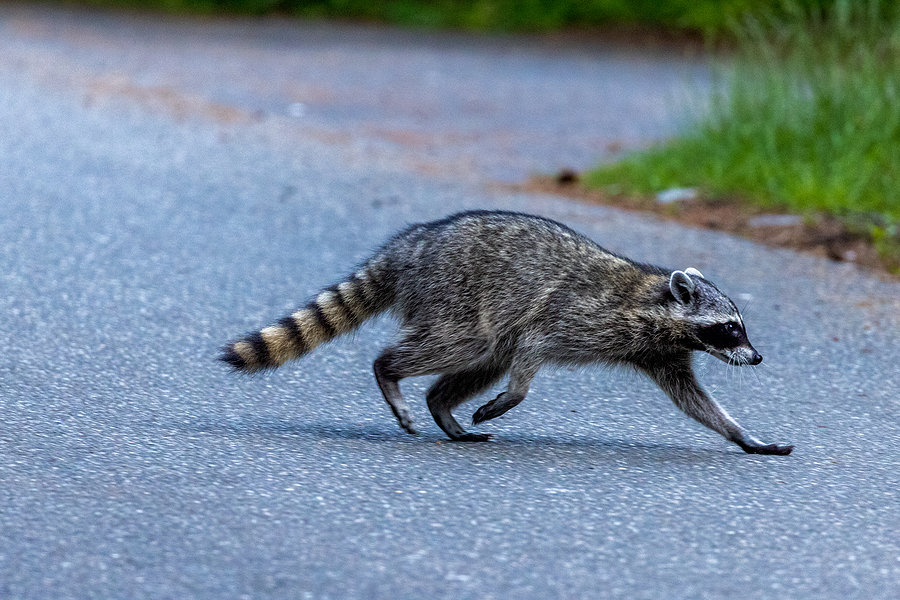Raccoons are one of the most easily recognizable pests that homeowners deal with. These common wildlife are known for their distinctive black masks over their eyes and ringed tails. Raccoons have gray and black fur and are about the size of an average housecat or small dog. They have 5 fingers on each hand and are extremely coordinated. They are highly intelligent with excellent memories. Raccoons are found in every state of the US.
Raccoons are scavengers and mostly hunt for food at night. They will eat almost anything. They are also highly adaptable allowing them to live in a wide variety of habitats (urban, suburban, rural, forest, mountain, coastal, and more).
When raccoons nest in or near your house they can cause significant damage to both your property and your health. Their damage isn’t just limited to tipped over trashcans. In their search for a nesting site they will rip off shingles, fascia boards, and even chimney vents. Once inside your home, they can destroy insulation, chew through electrical wires, and contaminate your home with urine and feces. They will dig up your yard in search of grubs and even tear off decking to get under porches and decks.
Signs of raccoons on or near your property include:
- Tipped over trash cans
- Damage to gardens or fish ponds
- Spilled or empty pet food bowls
- Knocked over bird feeders
- Disturbed compost piles
- Tracks or paw prints
- Calls that sound like an owl whistling at night
- Droppings (resembling small dog droppings, dark in color with a foul smell and often containing undigested seeds or other food)
Getting rid of raccoons can be difficult. They are crafty and can be difficult to trap. Here are some ways to prevent raccoons from taking over your home or yard.
Eliminate Food Sources
Nearby food sources will attract females to the area to nest and also allow populations to grow rapidly. Eliminating food sources makes your property less attractive to raccoons and other wildlife. Make sure to use heavy trashcans with secure lids. You may consider putting your cans in a rack or tying them to a secure post to prevent tipping. If your lids aren’t secure, use bungee cord or wire to make sure lids are secure. Bring in pet food before nightfall. Try to deter raccoons from bird feeders by using raccoon-proof feeders, hanging from shepherd’s hooks, or bringing them in overnight. Pick up any fallen fruit or nuts from the ground. Consider installing fencing around gardens, ponds, or compost piles. Electric fence is preferable as raccoons can climb over or dig under regular fencing. Don’t intentionally feed raccoons as this will only attract more and increase the population.
Eliminate Nesting Sites
Without a place to nest, raccoons will likely move on to a more hospitable environment. Clean up your yard and keep your grass mowed. Remove wood piles and thin out any overgrown shrubbery. Trim branches away from your roof, providing at least a 5′ gap between the roof and any trees. Get rid of any trellises or arbors that may allow access to your roof.
Eliminate Entry Points
Raccoons like to nest in chimneys so make sure it is sealed when not in use with a chimney cap that is tightly secured. Make sure there are no animals inside your chimney before sealing it off. Inspect the exterior of your home and identify any other possible entry points, as well. Close off spaces under porches, decks, and sheds with wire mesh. Make sure the bottom edge of the wire is buried at least 6 inches deep and extends out at least 12 inches. Make sure to back-cover the wire with soil.
Consider Other Remedies
There are several repellents and products designed to scare raccoons with motion and light. Raccoons are highly intelligent and these products will only be effective until they realize there is no threat. Trapping can also be dangerous for homeowners as these nuisance wildlife carry a wide range of parasites and diseases that can be harmful to both humans and pets. Raccoons will bite or scratch if they feel threatened or if they have their young near them. They are known to carry rabies, roundworm, and canine distemper.
If you have an issue with raccoons or any other wildlife, consider contacting a professional pest control company who specializes in wildlife control and wildlife exclusion. They can identify where raccoons may be feeding or nesting and safely and legally trap and relocate them.
You May Also Be Interested In:
Identifying and Controlling Armyworms
How to Bring Your Lawn Back to Life This Spring

